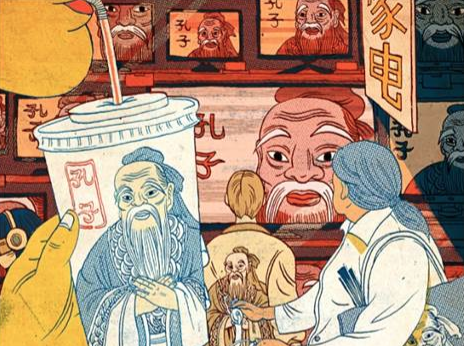The New Yorker’s Evan Osnos examines Confucianism’s post-Cultural Revolution rehabilitation:
No one has harnessed the interest in Confucius more successfully than Yu Dan, a professor of media studies at Beijing Normal University. She presented a popular series of lectures on state television and wrote a book, “Confucius from the Heart” (2006), that is said to have sold ten million copies. Today, she occupies a position in Chinese pop culture somewhere between Bernard-Henri Lévy and Dr. Phil. […] Scholars mock her work—one critic attended book signings in a T-shirt that read “Confucius is deeply worried”—but within a year Yu became the second-highest-paid author in China, after Guo Jingming, a writer of young-adult fiction who travelled with guards to hold back the crowds.
[…] I asked what prompted her to embrace the classics. She said that, like others her age, she had grown up denouncing the ancient scriptures. “When I began writing ‘Confucius from the Heart,’ a lot of people asked me, ‘Why are you writing this?’ And I said, ‘I am atoning for the crimes of my generation, because we were young and we criticized him mercilessly.’ ”
[…] After Yu became popular, the Party invited her to conferences, and she began presenting her readings of the classics in a political context. “Unlimited possibility leads to chaos, because you don’t know where to go or what to do,” she told me, adding, “We must rely on a strict system to resolve problems. As citizens, our duty is not necessarily to be perfect moral persons. Our duty is to be law-abiding citizens.” [Source]
Osnos discusses the article on The New Yorker’s Out Loud podcast, as well as others from his time in China including profiles of Ai Weiwei, the Dalai Lama, and Olympic boxer Zou Shiming, and accounts of the 2011 Wenzhou train disaster and a journey around Europe with a coachload of Chinese tourists. (Also hear Osnos discuss the “charade” of his departure from China at Sinica last summer.)
As in the Confucianism article, he describes the fate of Beijing author Lao She, who drowned himself following a Cultural Revolution “struggle session” in the temple next door to Osnos’ former home in Beijing. In China, Osnos says, “history and moments of immense significance lie around you like landmines. And you can live perfectly happily not seeing them, and then every once in a while you stumble on one.” He contemplated seeking out one of the Red Guards who had been present at Lao She’s beating, he says, but decided against it. But a similar account recently came unbidden to Alec Ash, who recorded it at the Anthill:
I asked Auntie what she did as a Red Guard. She waved vaguely in the direction of the hutongs to the south. “We struggled against landlords.” They would hang heavy wooden signs over the landlords’ necks, denoting them as capitalists, and make them take the “airplane” (feiji) position. That means body bent forwards from the waist at a right angle, arms back stiff and straight behind you, each hand clasping the other. Then … da si tamen. Beat them to death. [Source]







